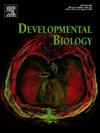Disease susceptibility implications of preferential inactivation of the paternal X chromosome in extraembryonic endoderm of the mouse
IF 2.5
3区 生物学
Q2 DEVELOPMENTAL BIOLOGY
引用次数: 0
Abstract
In the mouse, there is preferential inactivation of the paternally-derived X chromosome in extraembryonic tissues of early embryos, including trophectoderm and primitive endoderm or hypoblast. Although derivatives of these tissue have long been considered to be purely extraembryonic in nature, recent studies have shown that hypoblast-derived cells of the ‘extraembryonic’ visceral endoderm make a substantial cellular contribution to the definitive gut of the fetus. This raises questions about the eventual fate of these cells in the adult and potential disease implications due to the skewed inactivation of the paternally derived X in females heterozygous for X-linked mutations. Similar lineage studies of this tissue have not yet been done in human embryos but differences in the pattern of X chromosome inactivation between mouse and humans indicates that preferential X inactivation will not be an issue in human embryos. Nonetheless, comparisons between mouse and human will be important because of the widespread use of the mouse as a model system for study of genetics, development and disease.
小鼠胚胎外内胚层父系X染色体优先失活对疾病易感性的影响。
在小鼠中,在早期胚胎的胚胎外组织中,包括滋养外胚层和原始内胚层或下胚层,父系来源的X染色体优先失活。虽然这些组织的衍生物长期以来被认为是纯粹的胚胎外的,但最近的研究表明,“胚胎外”内脏内胚层的次胚衍生细胞对胎儿的最终肠道做出了实质性的细胞贡献。这就提出了关于这些细胞在成年后的最终命运的问题,以及由于雌性杂合X连锁突变的父系衍生X的偏失活而导致的潜在疾病影响。类似的谱系研究尚未在人类胚胎中进行,但小鼠和人类之间X染色体失活模式的差异表明,在人类胚胎中不会出现优先X染色体失活的问题。尽管如此,老鼠和人类之间的比较将是重要的,因为老鼠被广泛用作研究遗传、发育和疾病的模型系统。
本文章由计算机程序翻译,如有差异,请以英文原文为准。
求助全文
约1分钟内获得全文
求助全文
来源期刊

Developmental biology
生物-发育生物学
CiteScore
5.30
自引率
3.70%
发文量
182
审稿时长
1.5 months
期刊介绍:
Developmental Biology (DB) publishes original research on mechanisms of development, differentiation, and growth in animals and plants at the molecular, cellular, genetic and evolutionary levels. Areas of particular emphasis include transcriptional control mechanisms, embryonic patterning, cell-cell interactions, growth factors and signal transduction, and regulatory hierarchies in developing plants and animals.
 求助内容:
求助内容: 应助结果提醒方式:
应助结果提醒方式:


